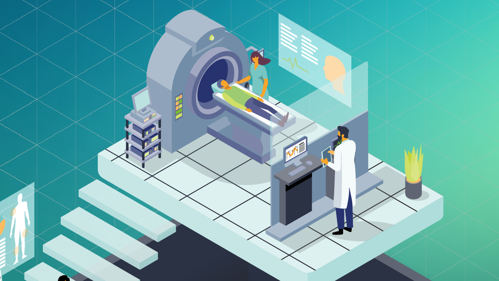First published in the Financial Times.
Within the venture capital investment universe, artificial intelligence (AI) and medical technology (MedTech) stand out as transformative asset classes. Both sectors have the potential to reshape industries and improve lives, making them compelling investment opportunities for venture capital managers (General Partners, or GPs).
However, achieving success in these fields requires a strategic, data-driven approach to navigate their unique complexities and risks. Guernsey has emerged as a preferred jurisdiction for GPs, offering a stable, investor-friendly environment that facilitates efficient capital deployment into these high-growth industries.
The AI investment playbook: Growth and strategies
The AI sector is experiencing unprecedented growth, attracting record-breaking venture capital investment; in excess of $100 billion in 2024, and representing 60% of deals in VC backed companies in Q4. However, the sheer volume of AI-related start-ups has created a highly competitive landscape, making it essential for investors to distinguish between genuine innovation and overhyped ventures.
Start-ups may claim to leverage AI, but only a fraction develop proprietary, groundbreaking technology. The cost of developing sophisticated AI models is significant, requiring vast computational resources. Meanwhile, the implementation of AI-driven applications is becoming more accessible, intensifying competition.
GPs face mounting pressure from limited partners (LPs) to deliver high returns within short fund lifecycles. AI is perceived as a high-growth asset class, yet entry valuations can be three to five times higher than in other sectors, amplifying both risks and rewards.

Investors must conduct rigorous due diligence to differentiate between genuine AI innovation and start-ups that rely on third-party AI models with minimal differentiation. Commercial viability is another key factor, as companies with a clear, executable pathway to commercialisation are more likely to generate sustainable returns.
The AI sector evolves rapidly, and delays in product deployment can erode a company’s competitive edge. Regulatory awareness is also critical, as increasing scrutiny on AI ethics and data privacy introduces additional compliance risks.
For GPs, investment structures within efficient regulatory jurisdictions provide a competitive advantage, allowing for faster deployment of capital and reduced operational friction. Guernsey’s flexible regulatory framework supports this need, offering a streamlined path for venture capital funds to capitalise on AI opportunities.
Unlocking MedTech’s potential: Navigating challenges and maximising growth
While AI is revolutionising industries through automation and data-driven insights, MedTech is transforming global healthcare with advanced diagnostics, wearable technology, and next-generation treatments. However, investment in MedTech presents distinct challenges, including lengthy regulatory approvals, high research and development costs, and extended time-to-market.
Developing medical treatments and devices requires extensive clinical trials and compliance with stringent regulatory bodies such as the FDA in the US and the MHRA in the UK. Unlike AI software, which can be iterated upon rapidly, MedTech solutions often require years of testing and approvals before commercialisation.

Despite these challenges, MedTech remains a highly lucrative investment sector. GPs can mitigate risks by focusing on niche areas where speed-to-market is faster and capital requirements are lower, such as diagnostic tools, which benefit from faster regulatory pathways and scalable adoption across healthcare markets, medical devices, which generally have shorter approval cycles compared to pharmaceuticals, reducing time-to-market, and remote patient monitoring, a high-growth area driven by telehealth expansion and ageing populations.
Successful MedTech investments require fund structures that accommodate longer development timelines, ensuring flexibility for follow-on investments, co-investments, and exit strategies. Guernsey’s cost-effective and adaptable fund structures are well-suited to this dynamic sector.
Guernsey: A strategic hub for Venture Capital
Given the capital intensity and regulatory demands of AI and MedTech investments, jurisdictional efficiency plays a crucial role in fund success. Guernsey has established itself as a leading domicile for venture capital managers, offering regulatory flexibility through fast-track licensing for venture capital funds in as little as three days, tax efficiency with competitive tax structures attractive to international investors, and cost savings, as Guernsey-domiciled funds can reduce operating costs by a seven-figure sum over their lifecycle compared to Luxembourg or the Cayman Islands. The island also boasts an expert ecosystem, with a strong network of legal, financial, and advisory professionals specialising in venture capital, and global connectivity, given its proximity to London, a major financial hub that facilitates investor access and deal-making.
Conclusion
As AI and MedTech continue to attract record levels of venture capital, the opportunities for investors and innovators have never been greater. The future of these sectors will be shaped by those who can combine vision with strategic execution, supported by environments that foster innovation, efficiency, and long-term growth.
Jurisdictional choice is more than a regulatory consideration—it is a strategic enabler. Guernsey, with its long-standing expertise, cost-effective structures, and world-leading speed to market, provides an agile and supportive ecosystem for investment managers. Its strong regulatory framework, validated by MoneyVal, demonstrates its ability to support high-growth industries. As venture capital continues to drive the next wave of technological breakthroughs, choosing the right foundation will be key to turning bold ideas into investor value.








